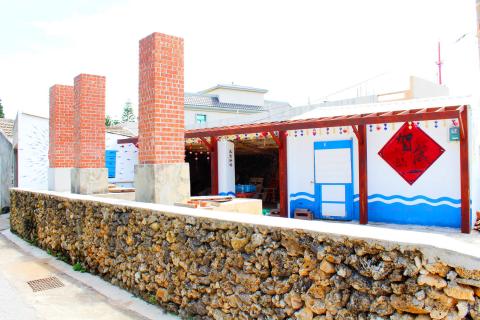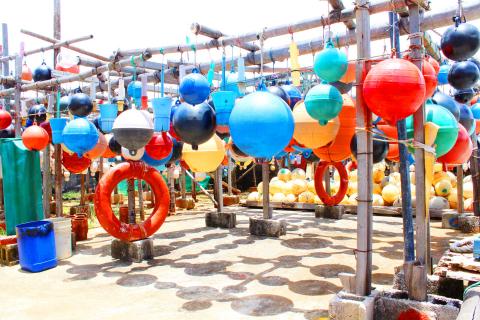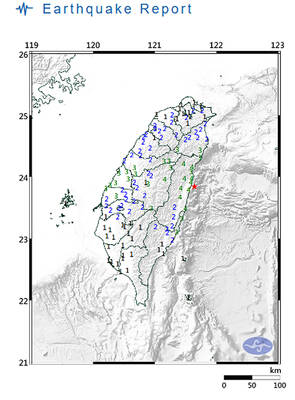Nanliao Village (南寮) on the sparsely populated outlying island of Penghu might not look very different from any other rural Taiwanese community at first, but take a closer look and the fishing-turned-farming community is full of surprises.
A distinctive feature of Nanliao is that coral is used as a building material, which can be seen in the caijhai (菜宅, vegetable houses) — windbreaks set up to protect vegetable plots from the northeast monsoon winds which blow from September to April, and on the facades of older houses
Due to its arid weather — the village has an annual precipitation of only about 1m — and the sandy composition of its soil, farmers in Nanliao mostly grow peanuts and sweet potatoes, which do not need much warer, said Nanliao Village Warden Chao Chia-hsieh (趙嘉協), who has been promoting organic farming in the community for many years.

Photo: Sean Lin, Taipei Times
Describing Nanliao as an eco-friendly community with an emphasis on recycling, he said that residents have found applications for many things that are usually regarded as worthless, including coral, cow manure, discarded plastic fishing floats and even the small evergreen tree white popinac — which is not native to Taiwan.
Chao said that “cow manure cakes,” made from cow manure mixed with crushed peanut shells to increase flammability, are used as fuel for cooking fish in a “fish stove,” a lidded, well-like structure where fish, usually sardines, are cooked before being dried in the sun and sold.
Small dried fish are a popular snack, especially for people living on Taiwan proper, he said.

Photo: Sean Lin, Taipei Times
Making cow manure cakes is a decades-old tradition passed down from a time when the community was destitute and had trouble finding firewood during winter.
He said that residents used the white popinac cut down by the Penghu County Government and boiled its bark to extract an orange dye used to color the veils worn by women when they work in the fields.
As to the uses of the spherical fishing floats used by coastal fish farms to secure fish nets, he said that the most famous example is a piece of installation art created by local man Chao Chang-shou (趙長壽), 82.
The piece features more than 100 fishing floats of various colors suspended from a wooden frame.
The floats are also a favorite at a community workshop where tourists can experience life in Nanliao, he said.
Floats are cut open, decorated and turned into artworks, he said.
He said that his vision for the village is the pursuit of steady development without the sacrifice of cultural heritage.
Chao, who grows fruit and vegetables on his organic farm, said his dream is to start a farmers’ market in the village.
Wang Chen-ju (王貞儒), a community planner and teacher at the workshop, said that her aim is to restore the village to its original state by rediscovering its uniqueness.
Wang said she stumbled upon the idea of restoring the village after an old well paved with coral stones was reconstructed with gravel, which upset many residents, who said that they would like the well to be fashioned in the traditional way.
“People want to relive the good old days. Even though we did not have much, we were happy,” she said. “It prompted me to start tracing the ‘lights’ and ‘shadows’ of this community. I started looking for the things characteristic of this area and the parts that need improving.”
She said that the residents’ hard work to promote the village’s culture finally came into fruition when the county government granted funds to the workshop to reinforce and redecorate some dilapidated buildings, which prompted many young people studying or working on Taiwan proper to bring their friends to visit over the most recent Tomb Sweeping Day holiday.
She said that her experience with Nanliao’s community revival can be summed up as “allowing residents to do the things they love without forcing them to accept unfamiliar ideas.”
The burgeoning business from reviving the community has prompted young people working or studying on Taiwan proper to return to the village to help with farming and promote local culture, Wang added.

A small number of Taiwanese this year lost their citizenship rights after traveling in China and obtaining a one-time Chinese passport to cross the border into Russia, a source said today. The people signed up through Chinese travel agencies for tours of neighboring Russia with companies claiming they could obtain Russian visas and fast-track border clearance, the source said on condition of anonymity. The travelers were actually issued one-time-use Chinese passports, they said. Taiwanese are prohibited from holding a Chinese passport or household registration. If found to have a Chinese ID, they may lose their resident status under Article 9-1

Taiwanese were praised for their composure after a video filmed by Taiwanese tourists capturing the moment a magnitude 7.5 earthquake struck Japan’s Aomori Prefecture went viral on social media. The video shows a hotel room shaking violently amid Monday’s quake, with objects falling to the ground. Two Taiwanese began filming with their mobile phones, while two others held the sides of a TV to prevent it from falling. When the shaking stopped, the pair calmly took down the TV and laid it flat on a tatami mat, the video shows. The video also captured the group talking about the safety of their companions bathing

PROBLEMATIC APP: Citing more than 1,000 fraud cases, the government is taking the app down for a year, but opposition voices are calling it censorship Chinese Nationalist Party (KMT) Chairwoman Cheng Li-wun (鄭麗文) yesterday decried a government plan to suspend access to Chinese social media platform Xiaohongshu (小紅書) for one year as censorship, while the Presidential Office backed the plan. The Ministry of the Interior on Thursday cited security risks and accusations that the Instagram-like app, known as Rednote in English, had figured in more than 1,700 fraud cases since last year. The company, which has about 3 million users in Taiwan, has not yet responded to requests for comment. “Many people online are already asking ‘How to climb over the firewall to access Xiaohongshu,’” Cheng posted on

A magnitude 5.7 earthquake yesterday struck off the coast of Hualien, causing brief transportation disruptions in northern and eastern Taiwan, as authorities said that aftershocks of magnitude 5 or higher could occur over the next three days. The quake, which hit at 7:24pm at a depth of 24.5km, registered an intensity of 4 in Hualien and Nantou counties, the Central Weather Administration (CWA) said. There were no immediate reports of damage or injuries. In Taipei, the MRT railway’s operations control center received an earthquake alert and initiated standard safety procedures, briefly halting trains on the Bannan (blue) line for about a minute.